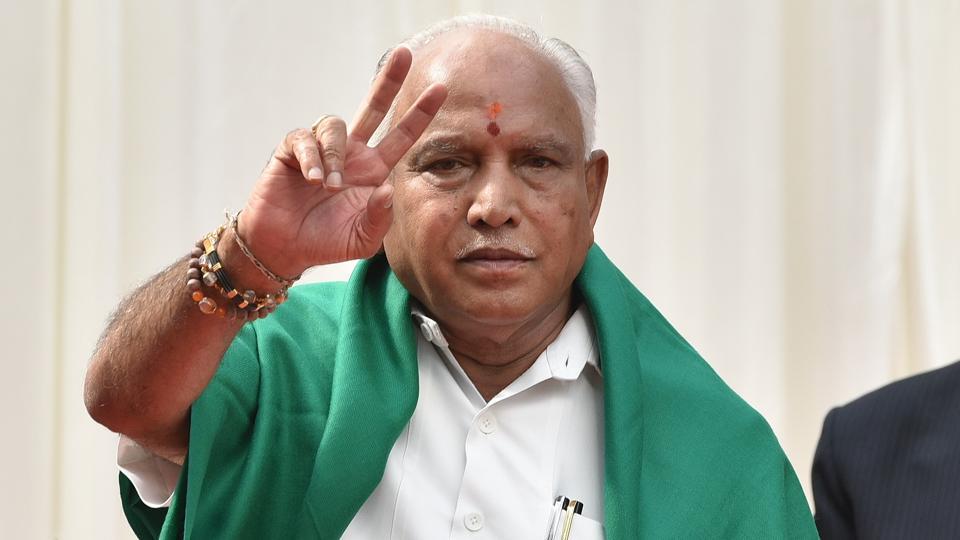
BJP's surprise picks for RS polls leave Yediyurappa camp in dismay
Even as four Rajya Sabha seats are falling vacant in Karnataka in June this year, the three major political parties — the BJP, the Congress and the JD(S) — played safe by nominating members within their reach.

Even as four Rajya Sabha seats are falling vacant in Karnataka in June this year, the three major political parties — the BJP, the Congress and the JD(S) — played safe by nominating members within their reach.
However, the BJP sprang a surprise by nominating two grassroots candidates — Eranna Kadadi (Belagavi) and Ashok Gasti (Raichur) — whose names did not feature on the list of candidates recommended by the state BJP unit. Both the leaders filed their nominations on Tuesday (June 9).
Even as two of the outgoing members — BK Hariprasad and Rajavee Gowda — belong to the Congress, the grand old party nominated only one member, Mallikarjun Kharge, to the Upper House of the Parliament. Meanwhile, the JD(S) nominated its party president and former prime minister, HD Deve Gowda.
The other two outgoing members of the Rajya Sabha from the state are Prabhakar Kore (BJP) and Kupendra Reddy (JD-S).
Related news: Deve Gowda to contest Rajya Sabha elections from Karnataka
A candidate needs 44 votes to be elected to the Rajya Sabha from Karnataka. The BJP, having 117 seats in the state assembly, hopes to send two candidates to the Upper House, while the Congress, which has 68 seats, can elect only one member. The JD(S), with the support of Congress, too can elect just one.
So, it’s a win-win for all.
But trouble is brewing in the Karnataka unit of BJP as the high command’s decision (of not adhering to the state unit’s recommendation) has left a bitter note on Chief Minister BS Yediyurappa’s loyalists.
The core committee of Karnataka BJP had last week recommended the names of Prabhakar Kore, a sitting member, Ramesh Katti, brother of former minister Umesh Katti, and Prakash Shetty, a hotelier from coastal Karnataka, for the upcoming Rajya Sabha elections.
Umesh Katti had lobbied hard for a cabinet berth, but failed to get one. So his demand was to elect his brother, Ramesh, to the Rajya Sabha. Even as the state unit had recommended Ramesh Katti’s name, the high command ignored it and rather nominated the 54-year-old Kadaki, who has an ABVP background.
Related news: Rift in Karnataka BJP? Congress says panel to decide rebels’ re-entry
Kadadi, who is in charge of the BJP’s Belagavi unit, was a former Zilla Panchayat president of the Gokak taluk. Though he is a Lingayat, he was never seen as a competitor to his fellow Lingayat BJP leader, Ramesh Katti.
Similarly, Gasti, a 54-year-old advocate, too had started his political career as an ABVP worker. Currently, he is the in-charge of mining-rich Ballari region. Gasti hails from the Savitha Samaj (barber community).
Political observers believe that the RSS and its leader BL Santosh had a bigger say in the selection of the Rajya Sabha candidates.
Umesh Katti has been airing his concerns about the ‘gross neglect’ of senior party leaders like him and even revolted by hosting 20 MLAs for dinner last week. Speculations were also rife that he would threaten to topple the Yediyurappa government.
This came at a time when Congress leader DK Shivakumar announced that some of the rebels who had defected from the party, now wanted to return. He said the Congress had also formed a committee to look into their requests.
Related news: Elections to 18 Rajya Sabha seats to be held on June 19
By choosing Kadadi and Gasti, both of whom have been associated with the party for nearly three decades, the BJP high command seems to have sent a message to those threatening to rebel, that they have no place in the party.
The move came at a time when there’s dissidence within the BJP and the RSS, and when the high command has overpowered the chief minister while making certain key decisions regarding the party affairs.
A senior party functionary said it is a clear indication that loyalty to the party and ideology are what matters, and not the loyalty to any particular leader. “It is also part of a strategy to nurture and elevate the second-rung leaders,” he noted.


